So, you’ve decided to become a part of the 61 million websites using WordPress. That’s a great choice. After all, you won’t need web design skills to get started, and you’ll have access to a wide array of plugins and themes.
However, it can be difficult to choose the best hosting company for WordPress, especially when you consider that not all hosts provide the same level of service.
To make your choice easier, we’ll explore factors like speed, pricing, and customer support, as well as the types of hosting you can use.
Plus, we’ll compare the hosting plans of some of the top WordPress hosts.
Let’s dive in.
Types of WordPress hosting
There are several types of hosting you can choose from for your website, depending on your needs and technical skill set.
Managed hosting
Managed hosting is when the hosting provider takes on the responsibility of managing the server and provides technical support.
Put differently, it's a hands-off option for website owners who don’t want to deal with the tedious task of managing day-to-day maintenance tasks.
It’s also ideal for businesses that lack the resources to manage these tasks internally.
This hosting setup ensures your website performs at peak levels and you get the best security. And since you won’t have to worry about the technical details, you can focus on your business and customers.
One downside of managed hosting is that you won’t have much control. For instance, you can’t configure your server to your liking.
Shared hosting
Shared hosting is a popular option in the hosting ecosystem. It’s so popular that most web hosts offer this service. As the name implies, it involves sharing server resources with other websites.
This option is suitable for when you’re starting out because it’s cost-effective — you can cut costs on things like bandwidth and storage.
However, since you have to share the same server with many websites, your website is prone to problems. For one, if one website is hit with increased traffic, it could slow down yours. And there’s a greater possibility of you getting hacked if another website has a vulnerability attackers can exploit (e.g., a plugin with a flaw).
If hackers compromise your system, it isn’t unusual to suffer long-term effects.
Overall, shared hosting is a good starting point and saves you money in the short run, but it can become expensive as time goes on.
Cloud hosting
With cloud hosting, a website and its applications are available in a cloud computing environment. It doesn’t rely on a single server. Instead, it involves multiple servers (both physical and virtual) that are interconnected.
For this reason, it offers greater availability and scalability.
That’s because if one server goes offline, others will take over, ensuring your website remains accessible. Moreover, a business can scale with ease because resources can be scaled up in response to increased demand. With a physical server, you would have to invest in additional hardware as you continue to grow.
Like the other types of web hosting we’ve looked at, cloud hosting also includes some downsides. For example, the host will manage your cloud infrastructure, which gives you limited control.
Also, cloud hosting can be vulnerable to cyberattacks.
For example, identity and access management issues (IAM) can lead to a breach or data loss. To counter this, you’ll need to adopt stringent measures around user access.
Keeping sensitive information secure can also be an uphill task. Thankfully, various cloud hosts, Nexcess included, provide features like user management and encryption to safeguard your data.
Virtual private server (VPS) hosting
Like shared hosting, VPS hosting uses a single server. However, this type of hosting takes a physical server and splits it into virtual servers, meaning a subsection of the server will be dedicated to your hosting needs.
And because you’ll get your own virtual server, you’ll be able to install your operating system and configure your server the way you want.
Basically, it’s like shared hosting but with virtualization layered on top. This equates to better website performance, higher uptime rates, and improved security.
Although VPS hosting brings with it many benefits, it isn’t without its drawbacks. For instance, it requires someone with a technical background to manage the server, so if you’re a new website owner, you may need to consider other options.
It’s also worth noting that it comes at a higher price point than shared hosting.
Dedicated hosting
When it comes to dedicated hosting, you get a server all to yourself. This option is ideal for high-traffic websites, so you can upgrade to this hosting plan once your website gets copious amounts of traffic.
And unlike shared hosting, you won’t be affected by whatever problems other websites may encounter.
One significant advantage of the dedicated server approach is that you’ll have greater control over your system. However, all the tasks related to ensuring your server operates at peak levels fall on you. You’ll have to handle backups, security, software updates, troubleshooting, and server monitoring.
In short, you’ll need to perform administrative tasks to keep things in tip-top shape. So, just like with VPS hosting, a lack of technical knowledge can work against you.
What to look for in WordPress hosting
When selecting the best hosting company for WordPress, you’ll need to consider certain factors before making a final decision. After all, with each WordPress host claiming to be the best, you must tread carefully.
Managed hosting for WordPress
Managed hosting is essentially the crème de la crème for WordPress websites. The web host handles everything pertaining to back end administration or the technical side of hosting. This includes plugin updates, backups, website maintenance, patching, and other security measures.
With managed WordPress hosting, you’ll free up time to handle essential aspects of your business while enjoying better security and optimal website performance. In addition, you’ll get peace of mind knowing that your website is running smoothly.
And should something happen, the issue will be resolved quickly. For these reasons and more, managed hosting is more expensive.
However, isn’t it worth the investment?
All in all, the best website hosts for WordPress usually offer managed hosting.
Speed and performance
How quickly your website loads has a major bearing on whether a user will stay or bounce off the page. Even if it takes an extra second for your website to load, you could lose out on potential sales. For example, Bidnamic found that for each second faster a page loads, the conversion rate increases by 17 percent.
Moreover, speed is a Google ranking factor, meaning poor performance can cause search engines to direct users away from your website.
Although most web hosts advertise fast loading times, their actual performance may differ. So, you may want to test the loading speeds of websites that use the hosting providers on your shortlist.
Tools like GTmetrix and PageSpeed Insights are handy in this regard.
It’s worth noting that besides your choice of WordPress host, other factors can affect website speed. For instance, heavy images will slow down your website. Not using a lightweight theme is also a possible culprit of slow loading speeds.
Storage and bandwidth
The amount of storage or disk space a host allocates is also essential because it impacts website performance. Storage is measured in MB and GB, among other units.
Different types of content have varying storage needs. For instance, videos take up more space than text. Also, be aware that the plugins you’ll add to increase functionality also take up space.
If you run out of storage, your website might become slow or experience server errors, resulting in a negative experience for online users.
So, when selecting the best website host for WordPress, check to see who offers sufficient storage for your needs. To establish how much storage space your website will use, you’ll need to know the average size of each webpage you plan to create.
Bandwidth is another factor to consider when assessing the best sites for WordPress hosting. It refers to the amount of data a web host can transfer between your website and users over a certain period. This measurement goes hand in hand with storage, so if you have limited bandwidth, it won’t matter if you have all the storage in the world.
For instance, if 2,000 visitors land on your website per day on a page that weighs 900 KB, it equates to 1,800 MB of bandwidth/day. In a month, that’s around 54 GB.
Should you exceed the limit, the host may charge extra, or your website might become inaccessible. Therefore, look for WordPress hosts that include a generous amount of bandwidth, as the more visitors you have, the more bandwidth you’ll require.
Otherwise, you’ll need to upgrade your monthly plan, meaning you’ll likely spend more as traffic increases.
Content delivery network (CDN) integration
As stated earlier, page speed is essential for optimal website performance. A CDN is one of the measures you can implement to ensure faster loading times. It serves up cached content from servers nearest to users' locations. So no matter their location, they’ll get access to content quickly.
In addition to improving website speed, a CDN is beneficial in several ways:
- It reduces bandwidth costs: The process of delivering cached content to an end user reduces bandwidth consumption.
- It minimizes the risk of downtime: Since origin servers are working in tandem with CDN servers, your website will stay online if some of the servers stop working.
- It enhances website security: For example, during distributed denial-of-service (DDoS) attacks, malicious threat actors overload your website with traffic, causing it to crash. When you use a CDN, user requests are spread across multiple locations, meaning there is a greater possibility of maintaining uptime if such an attack should happen.
So, when evaluating different hosting options, be on the lookout for those that offer a CDN. If you opt for a host without one, you’ll need to pay for this service separately, increasing hosting costs.
Popular CDN solutions for WordPress include Cloudflare and KeyCDN.
Customer support
You never know what could go wrong when running your website. The good news is that most web hosts offer round-the-clock support.
Just know that with each host, the level of support varies. Some only include one channel for support (often live chat), and others offer support via multiple channels, such as email and phone.
You’ll also find that certain hosts offer priority support but at an additional cost.
The best hosting sites for WordPress have support teams you can rely on, especially when you encounter technical problems (and lack technical know-how).
One way to find out whether a web host’s support team is skilled and solves issues quickly is to look at online reviews on sites like Trustpilot. For example, Nexcess scores 4.6 out of 5 on Trustpilot.
Pricing
How much should you part with to get top-notch WordPress hosting? The answer depends on your needs and budget.
Moreover, the best hosting sites for WordPress offer different price points, so you’ll need to compare hosts to get the best fit for your business.
For instance, you might find a particular web host’s plans are limiting in terms of traffic, but the price is high. Then, you may discover that with another web host, the opposite is true.
If you opt for the first host in this scenario, you’ll probably pay more as you scale to accommodate increased traffic.
That said, choosing the cheapest option will likely cost you more over time. You could find that your website isn’t as fast as it should be or that security is at the bare minimum.
The result? Decreased conversions or, worse, a system outage.
Also, be aware of hidden costs when comparing the best hosting companies for WordPress. These include things like security add-ons and overage fees.
And if your host doesn’t offer everything you need in one place, like regulation compliance, you’ll have to pay for this separately, pushing your expenses up.
The best hosting companies for WordPress sites
The hosting provider you choose should offer the features or resources you need. To that end, we’ve researched some of the best sites for WordPress hosting, so you can find the one that suits your needs.
Plus, you can easily add ecommerce shopping cart functionality to your WordPress website, as all the web hosts featured on our list offer WooCommerce hosting.
Pricing disclaimer: These prices were quoted at the time of publication and are subject to change.
Nexcess
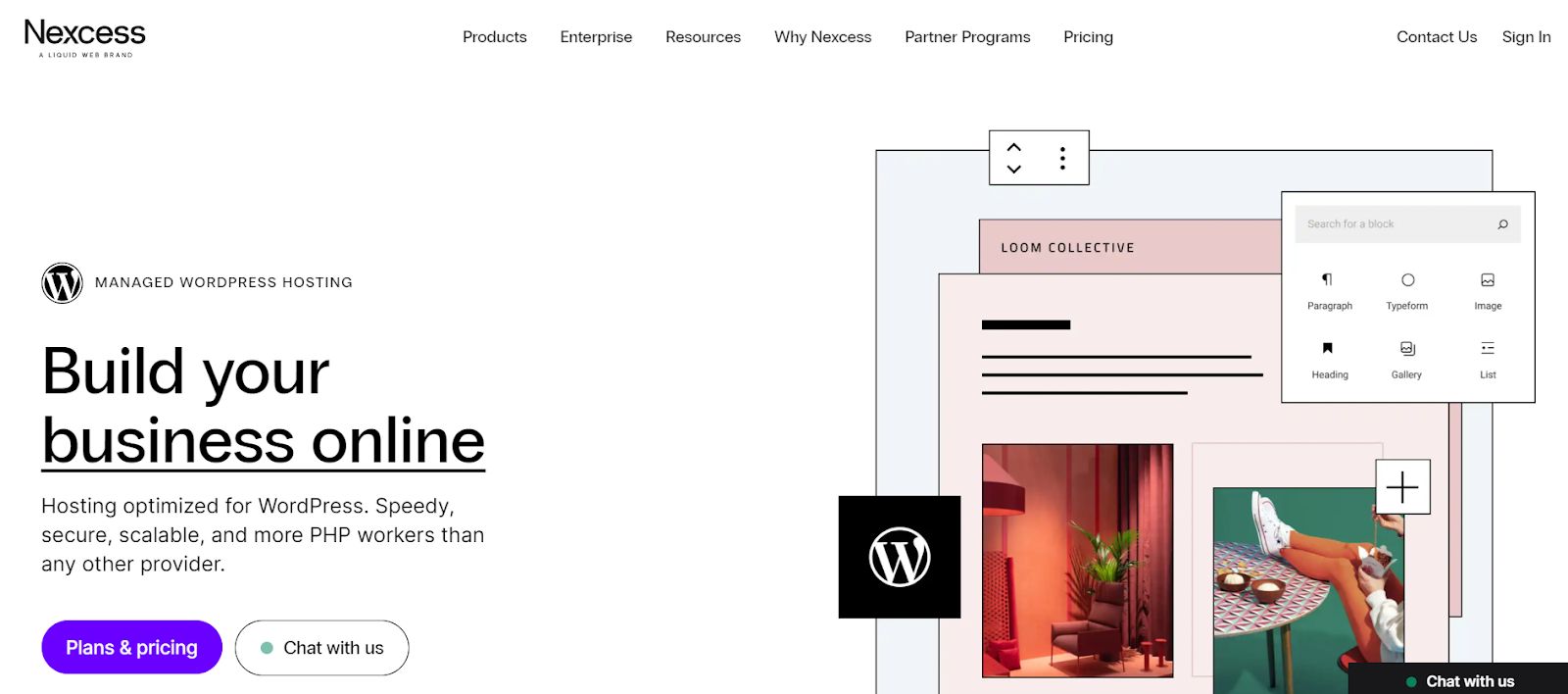
Nexcess has been around for 20+ years and is used by over 500,000 websites. We offer a range of WordPress hosting plans to suit any size of business, from new websites to enterprises, which means you can scale with ease when the need arises.
We offer many features to optimize speed and performance, such as autoscaling, a built-in CDN powered by Cloudflare, and Object Cache Pro. Plus, we provide staging and developer tools and performance tools, such as the Nexcess Plugin Performance Monitor.
A number of benefits can be derived from using this tool. For one thing, it monitors your website daily, so you can fix any issues that crop up quickly. For another, it lets you know the plugins that slow down your website, so you can act accordingly.
Our plans also give you peace of mind with regard to security, as they include Solid Security Pro and secure sockets layer (SSL) certificates.
If this isn’t good enough, Nexcess provides up to $200 to cover your costs when you switch providers and a full 30-day money-back guarantee.
Features:
- 99.998 percent uptime.
- 15+ GB storage.
- 2+ TB bandwidth.
- 24/7/365 customer support via chat, phone, and email.
- Free premium plugins with one-click installs.
- Optimized for WordPress.
- 10 global data centers to offer fast loading speeds around the world.
- Solid Security Pro security plugin, which includes malware protection.
- Automatic core updates and daily backups.
Best WordPress hosting for: Growing businesses looking for a fast, reliable, and scalable hosting service.
Price: Plans start at $17.50/month for 12 months.
SiteGround

SiteGround runs on Google Cloud and prioritizes performance, providing the SiteGround Optimizer. This plugin allows you to speed up your website in various ways, including reducing the size of images by up to 85 percent, minifying CSS and JavaScript files, and enabling GZIP compression.
However, things like 30 percent faster PHP, a staging site, priority support, and on-demand backups are reserved for higher-tier plans.
It’s also worth noting that introductory deals come at a lower price point than standard pricing.
And if things don’t pan out, you don’t need to worry because the host gives you a 30-day money-back guarantee.
Features:
- Free CDN.
- Daily backups.
- 10+ GB storage.
- 10,000 visits/month on cheapest plan.
- 24/7 support via chat, phone, and tickets.
Best WordPress hosting for: New website owners looking for an affordable hosting solution.
Price: Plans start at $2.99/month for the first year, then renew at $14.99/month.
Bluehost
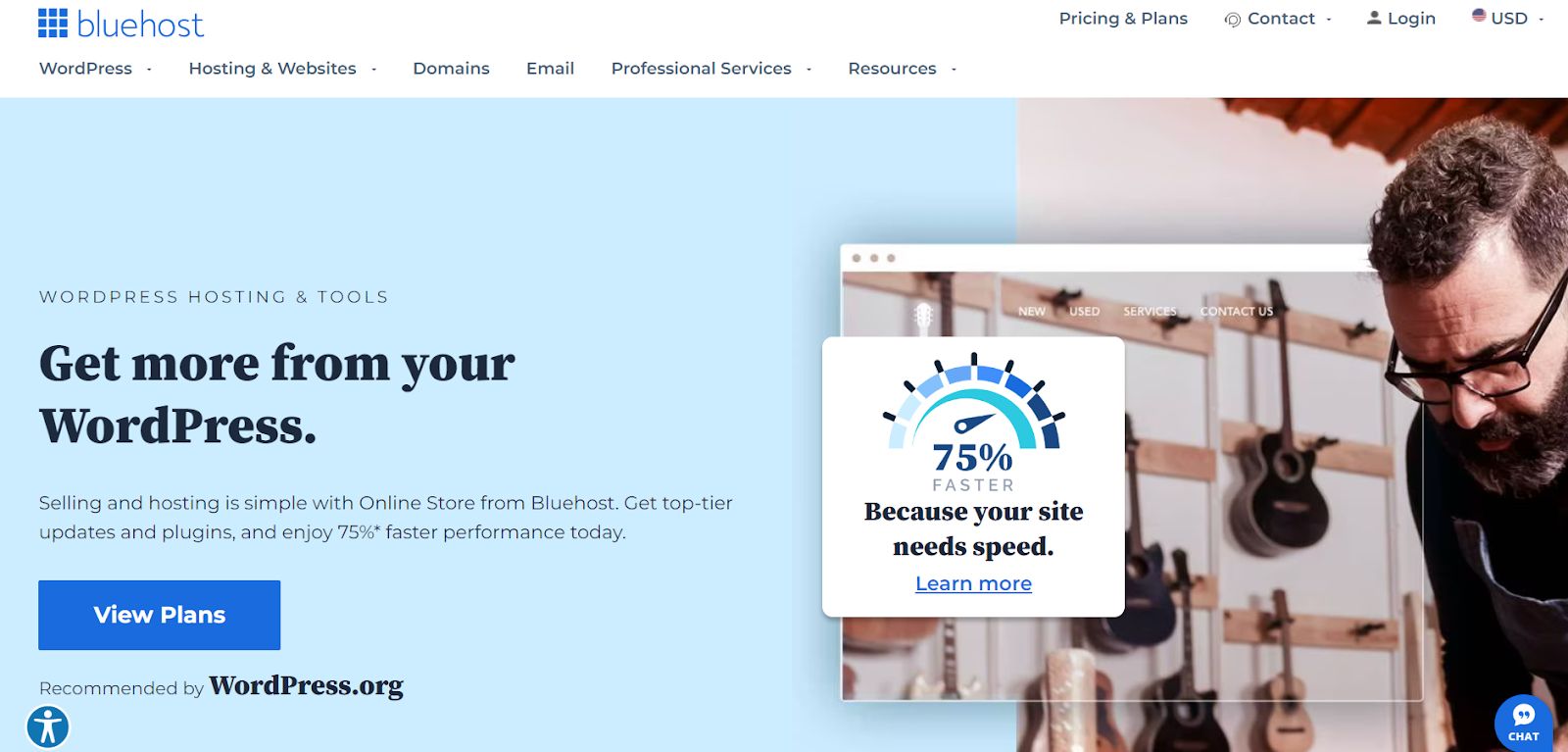
Bluehost is another affordable option. Getting started with this host is easy because it provides automatic WordPress installation, SSL certificates, and a free domain for up to 12 months.
What’s more, its marketplace offers a variety of themes and plugins that you can select from to customize your website the way you want and enhance its functionality.
However, its base plan is pretty limited, so you’ll need to upgrade to access features like a CDN and advanced website security.
Features:
- Automatic WordPress updates.
- Free domain name.
- 10+ GB storage.
- 24/7 WordPress support via phone and chat.
Best WordPress hosting for: Small businesses looking for reliable and cost-effective hosting.
Price: Plans start at $2.95/month for the first year, then renew at $10.99/month when billed annually.
Cloudways
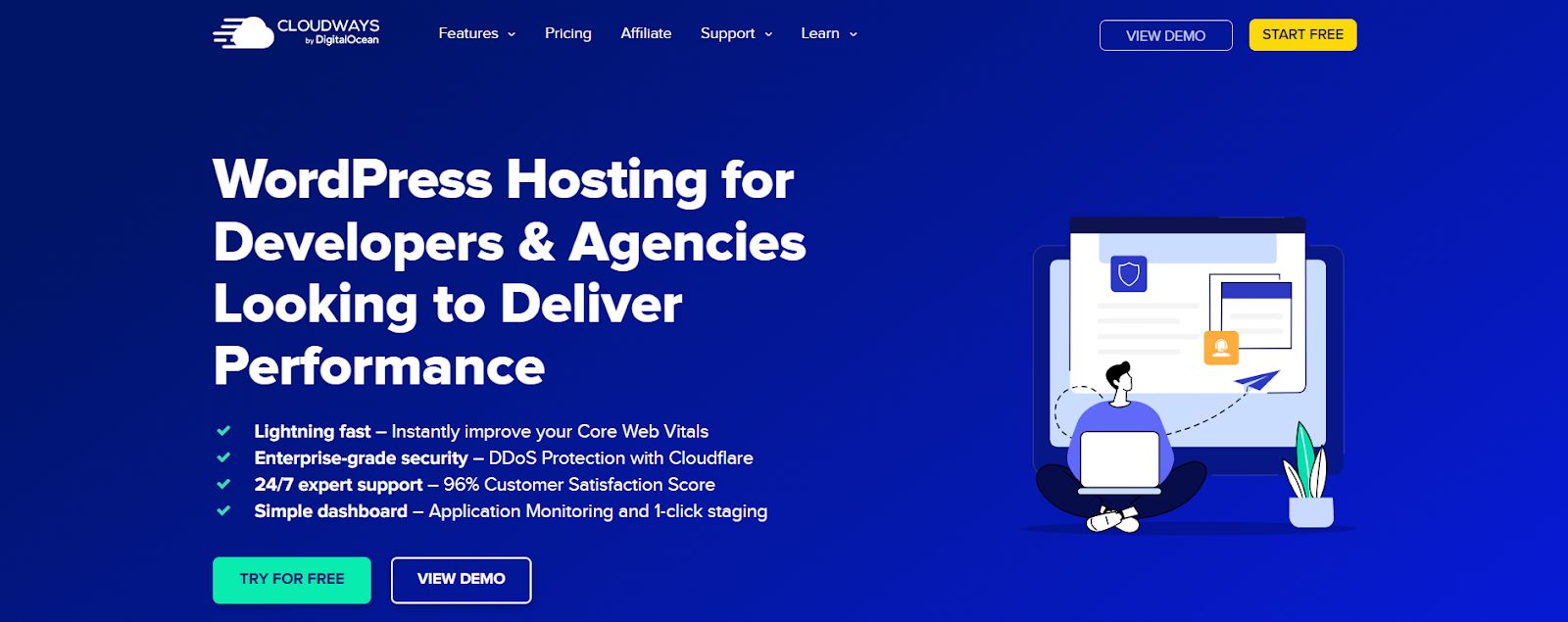
If you’re looking for the best hosting company for WordPress, Cloudways will make a great addition to your shortlist.
It lets you choose from top cloud providers, such as Digital Ocean and Amazon Web Services (AWS). Regardless of which cloud provider you choose, you’ll get a generous amount of resources.
A major selling point of Cloudways is its security options. It offers end-to-end encryption, two-factor authentication (2FA), SSL certificates, regular security patching, and DDoS protection (from $4.99/month).
Its loading speeds are also impressive — 200 to 400 milliseconds.
On the downside, Cloudways comes with a high learning curve. Also, it doesn’t offer a domain registration service.
Features:
- 24/7 real-time monitoring and chat support.
- One-click staging.
- Automated backups.
- Built-in WordPress cloning (clone websites from existing backups).
- 2+ GB bandwidth.
Best WordPress hosting for: Large business owners looking for secure WordPress hosting solutions.
Price: Plans start at $11/month.
WP Engine
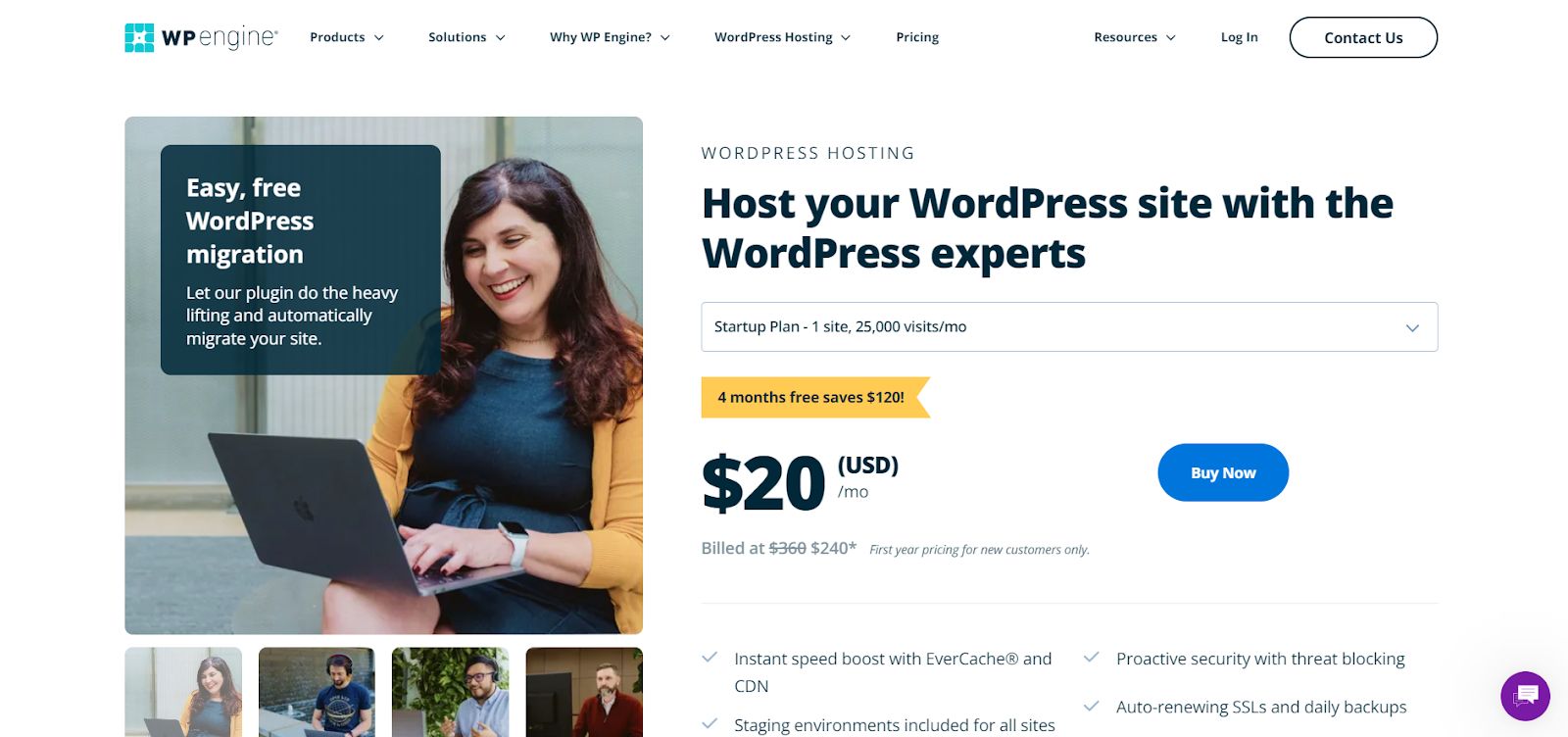
WP Engine offers a variety of WordPress plans, but be prepared to upgrade your plan as traffic grows.
To streamline website creation, WP Engine provides premium themes and Genesis blocks.
Regarding speed, it offers EverCache to speed up page load times and a CDN powered by Cloudflare.
It also includes some optional add-ons, like DDoS protection and a web application firewall (WAF).
One drawback is that a 99.99 percent uptime guarantee is only available with its most expensive plan. Also, the price is a little steep compared to other web hosts.
Features:
- Automatic plugin, theme, and PHP updates.
- Global CDN.
- SOC 2 and ISO 27001 compliance.
- 10+ GB storage.
- 50+ GB bandwidth.
- 24/7 chat support (phone support available with higher-tier plans).
Best WordPress hosting for: Small businesses looking for advanced features.
Price: Plans start at $20/month when billed annually.
Kinsta
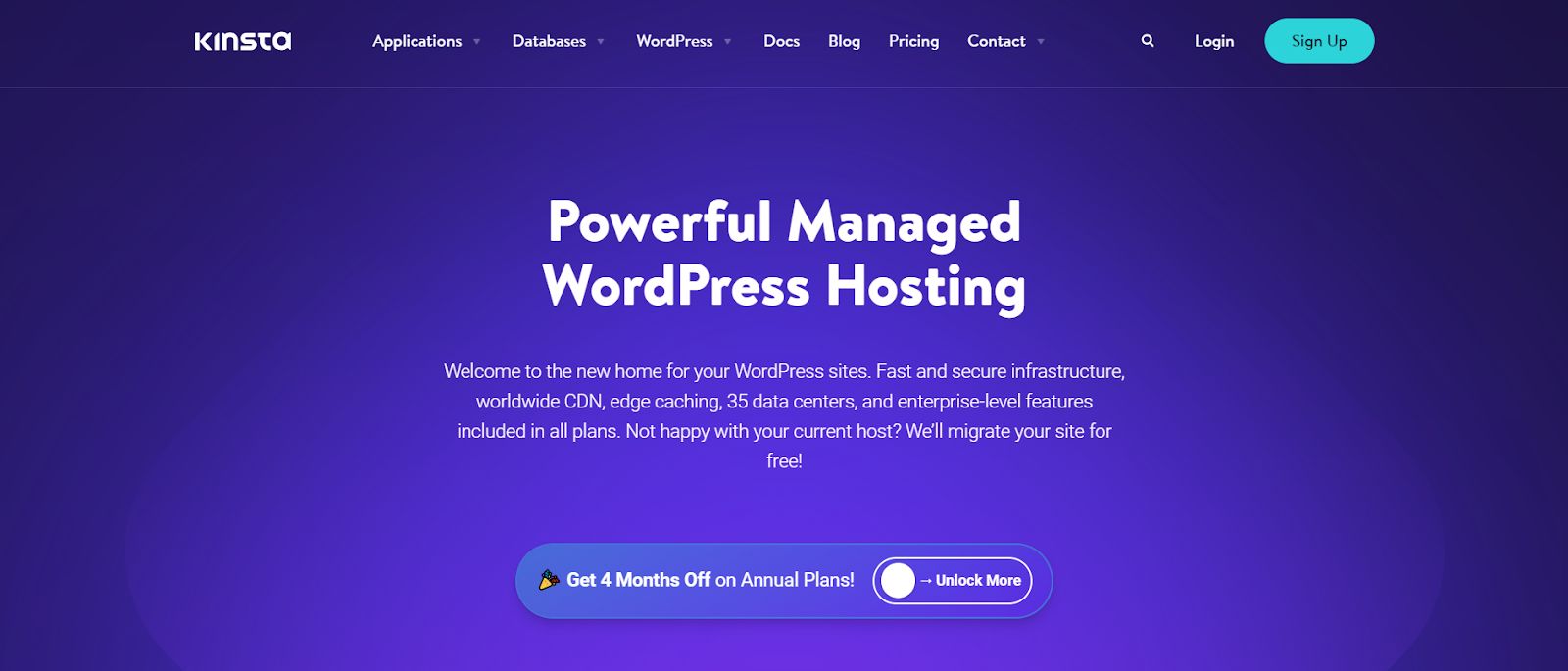
Kinsta provides many WordPress hosting plans to cater to websites of all sizes, from personal websites to small business ecommerce sites to enterprise-level companies.
Kinsta’s feature set is impressive, most notably its loading speeds. For example, it offers Edge Caching that cuts load time by 49 percent. In addition, its worldwide data centers allow you to serve up content quickly, regardless of users' locations.
It also provides a dashboard that lets you view and manage key information related to your website, such as user access, analytics, bandwidth and disk usage, and user activity.
Note that Kinsta provides one support channel — live chat. This means you can’t get help via phone or email. That said, it includes a knowledge base and documentation to help when needed.
Also, be aware that backups last for only 14 days with cheaper plans.
Features:
- Application performance monitor (APM).
- DDoS protection.
- HTTP/3-enabled CDN.
- 24/7 chat support.
- 10+ GB storage.
- 25,000 visits/month with cheapest plan.
Best WordPress hosting for: Growing businesses looking for a fast WordPress hosting solution.
Price: Plans start at $23.33/month for 12 months.
HostGator

HostGator’s WordPress packages include a free domain, a wide selection of themes, and one-click WordPress installs. So, if you’re a beginner, getting started is a breeze.
In terms of security, it provides malware protection and SSL certificates.
If you don't find HostGator a good fit for your website, there’s a 30-day money-back guarantee. And if you run into any issues, it offers 24/7 live chat and phone support.
However, the web host lacks a focus on speed, and this might negatively impact user experience (UX) and search engine optimization (SEO). In addition, renewal fees are more than twice the price of the introductory offer.
Features:
- Free site migration.
- 100,000 visits/month with cheapest plan.
- Free email and domain.
- Weekly backups.
Best WordPress hosting for: Small business owners looking for affordable WordPress hosting.
Price: Plans start at $5.95/month for 36 months and renew at $12.99/month for 36 months.
GoDaddy
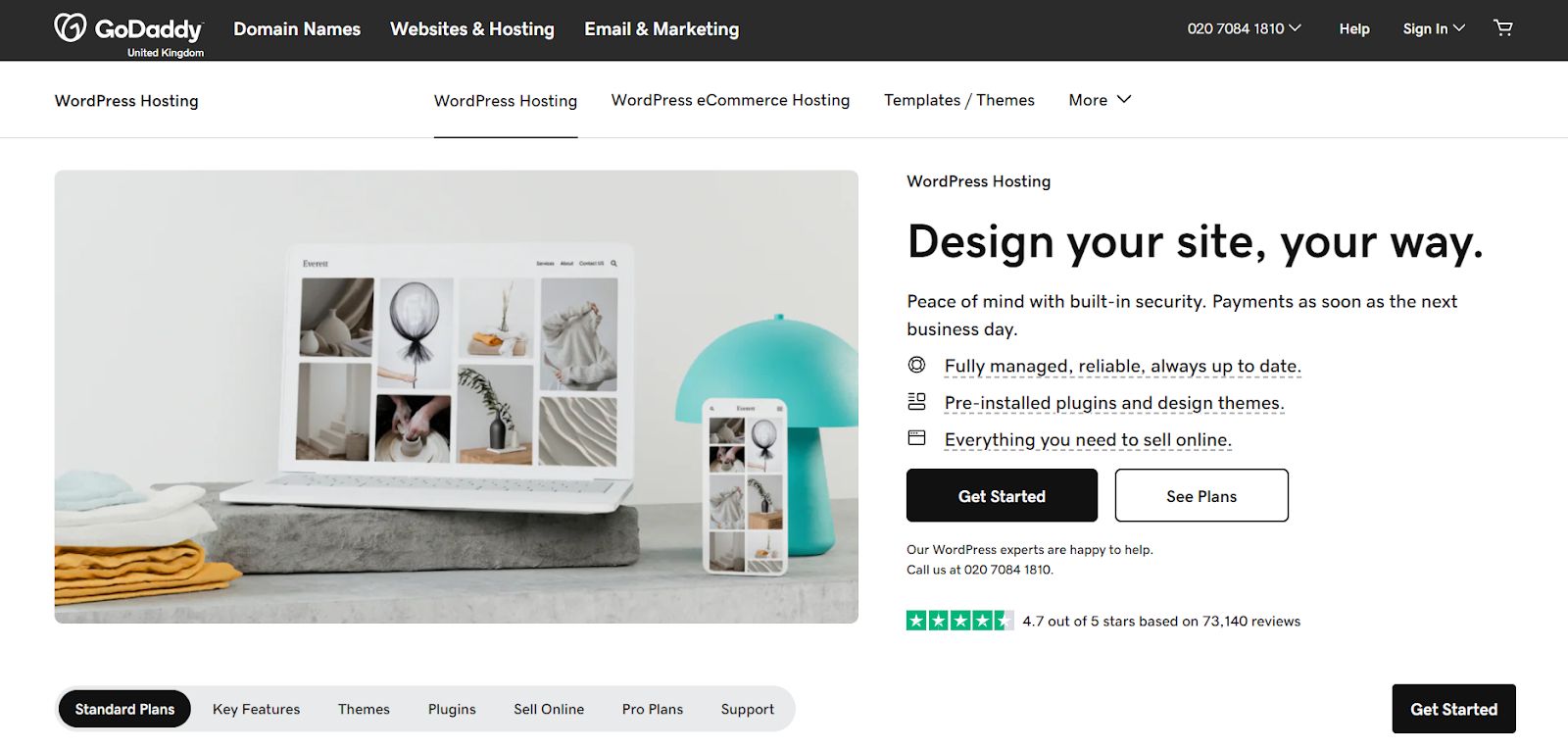
Like many of the hosts on our list, GoDaddy provides options for different budgets.
Beginners can quickly get set up since GoDaddy includes pre-built sites. All you need to do is choose your industry, and voilà, you’re ready to go. And like with Bluehost, WordPress comes pre-installed.
Using a temporary domain is also possible if you haven't chosen your business name yet.
Regarding website speed, you’ll find a Cloudflare CDN and non-volatile memory express (NVMe) solid state drives (SSDs).
You also won’t need to worry about your website’s security — the host offers a WAF and malware protection.
One drawback is that renewal fees are costly, so you’ll pay considerably more once the introductory offer ends. Also, the cheaper plans don’t offer much in terms of storage.
Features:
- Daily backups that last for 30 days.
- 99.99 percent uptime.
- Automatic WordPress, plugin, and PHP updates.
- Automatic renewal of free SSL certificates.
- 5+ GB storage.
- 24/7 phone and chat support.
Best WordPress hosting for: Entrepreneurs looking for fast hosting at a lower starting price point.
Price: Plans start at $8.99/month when billed annually and renew at $11.99/month.
Bottom line on the best hosting companies for WordPress
We hope our guide will point you in the right direction when selecting the best hosting company for WordPress.
Ultimately, your choice of host depends on your priorities and specific needs. However, things like speed and performance can’t be overlooked. If you rush the decision-making process, you may end up feeling frustrated and unsatisfied down the road.
At Nexcess, we go the extra mile. With our managed WordPress hosting plans, you can focus on what matters and leave all the technical stuff to us. Our plans also include strong security options, email hosting, free migrations, and round-the-clock premium support.
Ready to build your WordPress website? Contact us today and learn more about what we can do for you.

